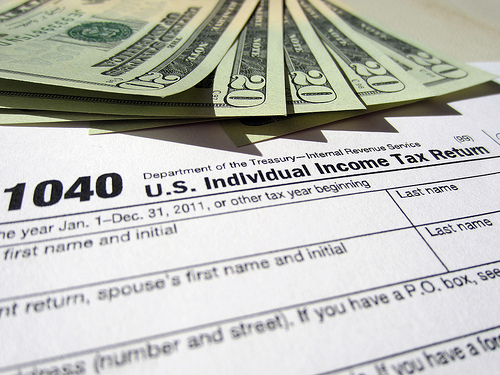There’s just about one month left until taxes are due! Are you ready? We like to file ours as soon as we receive our W2’s in the mail, just in case anything unexpected gets thrown our way – we would never want to get too close to the deadline just to find out we owe more than expected. This doesn’t have to be a stressful or difficult time to dread! Sometimes I think my husband is actually excited to do our taxes. Keep a few of these tips and ideas in mind when filing this year (or even better, when planning for NEXT year) to be smarter about your money and to keep any worries or concerns at bay.
File on your own. Personal taxes, for many people, are fairly simple and don’t require a professional’s help. There are a ton of online services, like TurboTax, that now offer step-by-step instructions to help you file your taxes on your own for little or no money. Why pay someone else to do something you’re perfectly capable of doing yourself?
Take advantage of any tax credits you might be eligible for. You can often get tax credits for things such as energy-efficient home improvements or installing alternative energy equipment (go green to save green!). You can also get a credit for having a child or buying a new home. Do a little research to see what’s out there that could apply to you, and check for limits or restrictions to make sure you qualify.
Consider deductions if you itemize your taxes. Some of the most common deductions that people claim are charitable donations, mortgage interest, home office needs, student loan interest, child care, and certain medical and dental expenses. It’s worth checking to see if itemizing your taxes is worth your while.
Make your retirement contributions count. Adding to your retirement savings lowers your taxable take-home paycheck, and contributions to a 401k or an IRA are tax deductible. You can also consider shifting some of your funds to a Roth 401k if your employer offers it. While you won’t get a tax break for this now, your money will come out tax-free when it’s time to withdraw for retirement.
Consider a flexible spending account. When signing up for your benefits at work, consider whether signing up for a flexible spending account could be beneficial to you. Under a flexible account program, funds are taken from your paycheck on a pre-tax basis, which would reduce your taxable income, and are refunded to you when you submit the appropriate claim forms to your benefits department. FSAs are generally used for health care and dependent care.
Avoid the rush. Some services might entice you with a “Rapid Refund” offer for a small fee, but in reality, refunds tend to come pretty quickly without this, especially if you set up direct deposit.
Use your refund wisely. Many people consider their refunds “bonus money,” but it’s essentially money that you paid the government over the course of the year. Instead of spending it on something more frivolous, use that chunk of change to add to your savings or pay down any outstanding debt you might have.
Have you filed your taxes yet, or do you wait until the last minute? What methods have you found to be the easiest?

